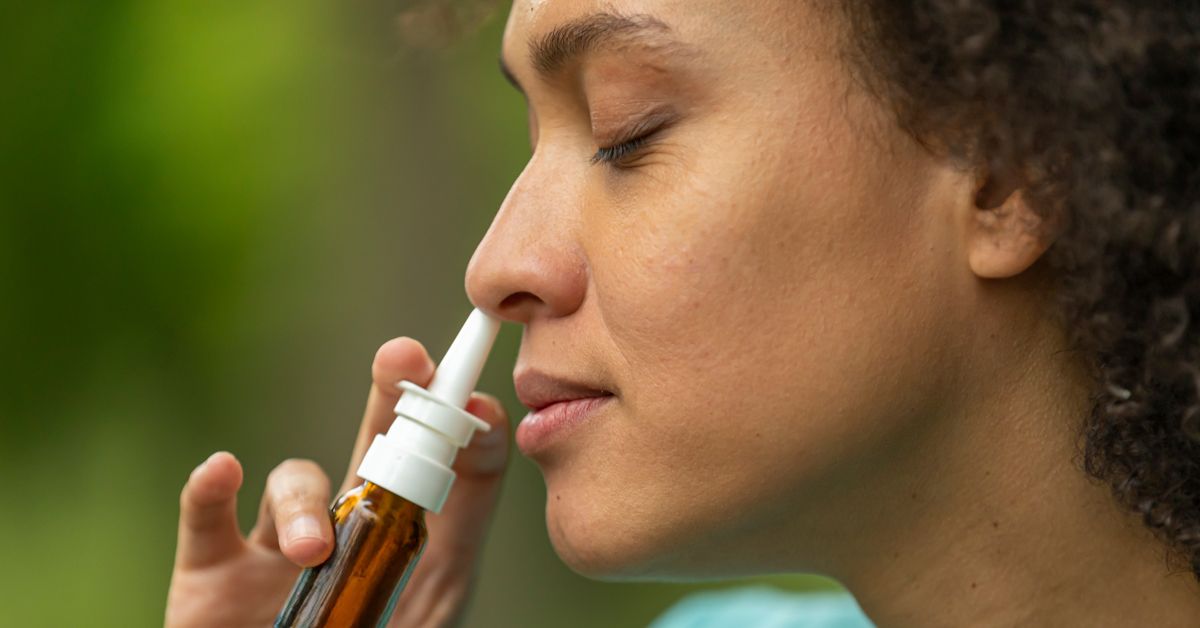A common allergy nasal spray, azelastine (Astepro, Astelin), may lower the risk of contracting COVID-19 and other respiratory infections, according to a phase 2, double-blind, placebo-controlled trial published online Sept. 2 in JAMA Internal Medicine.
Study design and participants
Researchers at Saarland University Hospital in Germany enrolled 450 healthy adults aged 18 to 65 between March 2023 and July 2024. Most participants were female (66%), identified as white (93%), and had received at least one COVID-19 vaccine dose (median three doses). None had signs of acute infection at enrollment. Recruitment was open to the public.
Participants were randomized to receive either azelastine 0.1% nasal spray (1 mg/mL azelastine hydrochloride) or an identical-looking placebo. Both sprays contained inactive ingredients such as hypromellose, sodium chloride, and purified water. The dosing regimen was one puff in each nostril three times daily for 56 days, increased to five times daily for three days if symptoms developed or after known exposure.
Testing and outcomes
SARS-CoV-2 rapid antigen tests were performed twice weekly by trained staff, with PCR confirmation for positives. Symptomatic participants with negative rapid tests underwent multiplex PCR screening for other respiratory viruses. The primary outcome was PCR-confirmed COVID-19 during the 56-day period. Secondary outcomes included symptomatic COVID-19, time to infection, duration of positive tests, incidence of other respiratory infections, and safety events.
Key results
– COVID-19 incidence: 2.2% of azelastine users versus 6.7% of placebo users tested PCR-positive for SARS-CoV-2, a relative risk reduction of about 69%.
– Time to infection: average 31 days in the azelastine group versus 19 days in placebo.
– Duration of positive rapid tests: mean 3.4 days with azelastine versus 5.1 days with placebo.
– Rhinovirus (common cold): 1.8% of azelastine users tested positive versus 6.3% of placebo users, about a 71% lower risk.
– Any laboratory-confirmed respiratory infection: 8.4% in the azelastine group versus 18.8% in placebo.
Safety
Side effects were generally mild and consistent with known azelastine effects. Bitter taste occurred in 9.3% of azelastine users versus 1.3% of placebo. Nosebleeds were reported by 6.6% of azelastine users and 4% of placebo users. Tiredness and dizziness were noted as possible effects. Serious adverse events were rare and none were considered related to the spray. No deaths occurred.
Expert guidance and limitations
Parth Bhavsar, MD, noted potential dizziness and advised avoiding alcohol or sedatives while using azelastine, and caution when driving or operating machinery. He said azelastine does not cause rebound congestion like some decongestant sprays and that dose-dependent drowsiness and local nasal burning or nosebleeds are the principal practical risks with prolonged or more frequent dosing. People with recurrent nosebleeds or recent nasal surgery should consult a physician.
Steven Goldberg, MD, MBA, cautioned that people with known hypersensitivity to azelastine or ingredients should avoid it, and that it is not recommended for pregnant or breastfeeding people due to limited safety data. He suggested using OTC azelastine HCl 0.1% or 0.15% per label instructions (typically once or twice daily) and considering short-term use during travel, high-exposure situations, or early symptom onset. He advised consulting a doctor for longer-term use or underlying health concerns.
The study’s limitations include its relatively small size and conduct at a single location with a majority-white population, so larger, more diverse trials are needed to confirm findings.
Public health note
Authors and experts emphasize that azelastine nasal spray, while showing early promise for reducing viral infections and viral load, should be viewed as a complementary tool and not a substitute for COVID-19 vaccination, rapid testing, and other public health measures.


